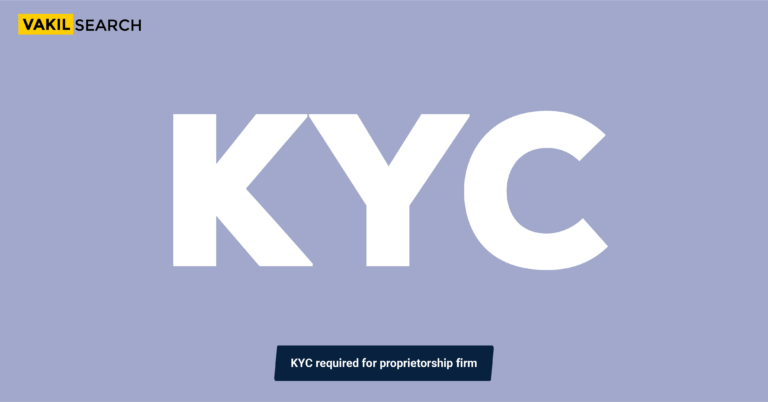Did you just start out as a sole proprietor & want to understand various aspects related to filing ITR for Sole Proprietorship Firm? Read on to learn more!
Similar to other incorporated businesses like partnerships and corporations, a single proprietorship also has to pay taxes on its earnings. A sole proprietorship must file its ITR using the same procedure as individual filings because, in terms of legal standing, it is treated the same as the owner. As a result, the proprietorship is subject to the same legal obligations that govern the payment of the proprietor’s income tax. This article will help you in understanding various components of ITR filing for Sole Proprietorship Firm.
Which ITR form to File for Sole Proprietorship Firm?
Depending on the type of business, a proprietorship firm may file:
- ITR 3: If a Hindu Undivided Family or other proprietors are in charge of the proprietorship business.
- ITR 4: If the proprietorship firm is subject to the presumptive taxation scheme.
Due Dates To File An ITR For Sole Proprietorship Firm
The likelihood of a tax audit determines the due date for ITR filing for proprietorship firm
- 31st July: For proprietorship businesses where a tax audit is not required.
- 30th September: For sole proprietorship businesses where a tax audit is required.
- 30th November: For sole proprietorship businesses that conduct cross-border business activities.
How To File An ITR For Sole Proprietorship In India
Steps for E-filing ITR for small proprietorship business are as follows:
- Firstly, make sure to apply for a PAN Card. The Internal Revenue Service sends this card to each taxpayer. It provides a one-of-a-kind Permanent Account Number (PAN) to the cardholder, which is necessary to pay taxes.
- The proprietor’s PAN must be used to pay taxes and submit returns because a proprietorship lacks a distinct legal entity.
- At the e-filing portal, you must first register yourself. However, if you are already registered, you must log in using your PAN.Then choose “Income Tax Return” from the drop-down list under the “E-filing” section.On this page, you must choose one of the alternatives below:
- Year of Assessment
- ITR Form
- Type of Filing (Original/Revised)
- In the submission option, select Prepare and Submit.
- Press the enter key to proceed. You must carefully complete all of the information provided on the new page.
- While certain details will be necessary, others may depend on its applicability.
- You must choose a verification method after filling out all of the necessary fields. Two alternatives for filing are electronic, and one is physical. There are three filing options.
- Select e-verify to have the filing immediately validated.
- After 120 days, e-verify your ITR. This will allow you a chance to amend any necessary information.
- Tap on “I do not wish to e-verify” to proceed further.
- From the drop-down list, choose “Preview and Submit.” To double-check any errors, you can preview the return before submitting it.
- Following submission via the e-verify option, you can validate your return using an OTP or an EVC (Electronic Verification Code). The OTP/EVC must be submitted within 60 seconds for successful verification.
Who Can Opt For A Presumptive Taxation Scheme?
Presumptive taxation plans are an option for professionals and small businesses. You can avoid the headaches of keeping accounting records and having tax audits performed by choosing this scheme.
Under Section 44AD:
Businesses with annual revenue of less than Rs 2 crore can choose to declare 8% (or 6% in the case of 95% digital transactions) of that revenue as profits.
Under Section 44ADA:
Some professions have the option of paying tax on 50% of their gross receipts. Only the following professions are affected if their annual gross receipts do not exceed Rs 50 lakh:
- Interior decorations
- Technical consulting
- Engineering
- Accounting
- Legal
- Medical
- Architecture
- Any other notified professionals
Under Section 44AE:
If a taxpayer operates, rents, or leases a goods carriage and does not own more than ten such vehicles, they can choose to disclose their income under the scheme at a rate of Rs. 7,500 per vehicle every month. Taxpayers have the option to pay a sum equivalent to Rs 1,000 per tonne of gross vehicle weight or unladen weight for each month or portion of a month that the heavy goods vehicle was under their ownership in the preceding year if the gross vehicle weight is 12MT or more (heavy goods vehicle).
Income Tax Audit for Sole Proprietorship Firm
If a proprietorship firm falls into one of the following categories, an income tax audit is required:
- If the proprietorship firm has a turnover of more than INR 1 crore during the assessment year.
- In the case of a professional, if the total receipts of the proprietorship surpass INR 50 lakh.
- Regardless of the annual turnover, a tax audit is required if the proprietorship is subject to any presumptive tax system.
Which ITR To File If My Accounts Are Audited?
If you are qualified to declare profits from your business and profession on a presumptive basis under any of the aforementioned sections, you can choose to do so by using the ITR-4 form when filing your ITR (Section 44AD, 44ADA or 44AE). However, you should file ITR-3 if you have kept accurate records of your finances and other paperwork. The account books are audited in accordance with section 44AB if you want to reveal smaller profits.A specific class of businesses is subject to income tax audit under Section 44AB. If an owner is operating a firm and its annual sales turnover reaches Rs 1 crore, a tax audit is required.
Conclusion
Simply put, a sole proprietorship is a small independent company that is owned and run by one person. Furthermore, these are unregistered businesses that are among the easiest to operate.Single proprietorships are relatively widespread in the unorganised business world due to their simplicity, specifically among small merchants and traders. In India, a sole proprietorship is not taxed as a distinct legal entity. Even if working as a sole proprietor is the most basic form of running a business or profession, it is still necessary to comply with income tax laws and file income tax returns on or before the deadline. Any individual in India can benefit greatly by filing an ITR. Vakilsearch can thus help you in filing an ITR for sole proprietorship so that you can avoid difficulty in the form of notices and penalties.
Read More:










